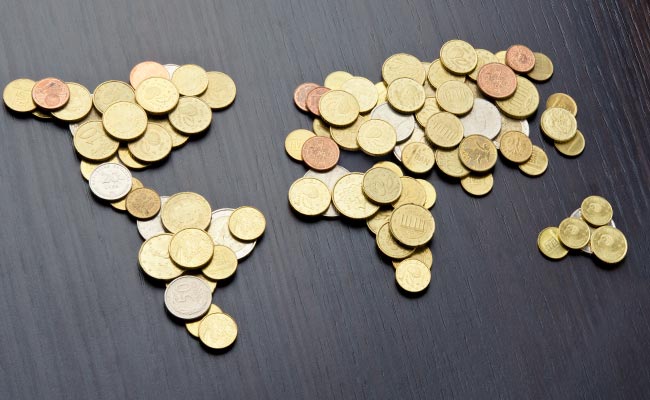
Lack of trade finance can be a barrier for Afro-Asian nations
The Dollar Business Bureau  “Lack of development in the financial sector can be a significant barrier to trade,” says Roberto Azevêdo, Director-General, World Trade Organization (WTO). Speaking on the sidelines of a seminar “Trade Finance in Developing Countries,” the WTO official referred to a recent WTO Secretariat paper that showed trade financing gaps are “the highest in the poorest countries, notably in Africa and Asia”. Up to 80% of global trade is supported by some form of financing or credit insurance. Yet in many countries there is a lack of capacity in the financial sector to support trade, and also a lack of access to the international financial system. Therefore the ability of these countries to use simple instruments such as ‘letters of credit’ is limited, he said. The impact of these limitations on a country's trading potential can be very, very significant. After the financial crisis, the supply of trade finance has largely returned to normal levels in the major markets — but not everywhere and not for everyone. The structural difficulties of poor countries in accessing trade finance have not disappeared — indeed the situation may well have declined due to the effects of the crisis, he said, adding, there are indications that markets are even more selective now. Under increased regulatory scrutiny, many institutions have lowered their risk-appetites and are focusing more on their established customers. Some are deliberately decreasing their number of clients in a so-called "flight to quality". In this environment, the lower end of the market has been struggling to obtain affordable finance, with the smaller companies in the smaller, less-developed countries affected the most. A survey by the African Development Bank of 300 banks operating in 45 African countries found that the market for trade finance was somewhere between US$ 330 and US$ 350 billion. It also found that this could be markedly higher if a significant share of the financing requested by traders had not been rejected. Based on such rejections, the estimate for the value of unmet demand for trade finance in Africa is between 110 and 120 billion dollars. This gap represents one-third of the existing market. The main reasons for the rejection of requests for financing were - the lack of creditworthiness or poor credit history, the insufficient limits granted by endorsing banks to local African issuing banks, the small size of the balance sheets of African banks, and insufficient US dollar liquidity. Some of these constraints are structural, and can only be addressed in the medium to long term. The retreat of global banks from Africa, and from other poor countries, is one such issue. The Asian Development Bank conducted a similar survey in Asia, looking at countries like Vietnam, Cambodia, Bangladesh, Pakistan and India. According to preliminary estimates the unmet demand there is around US$ 800 billion. Small and medium-sized enterprises are the most credit constrained as 50% of their requests for trade finance are estimated to be rejected. This is compared to just 7% for multinational corporations. Moreover, two-thirds of the companies surveyed reported that they did not seek alternatives for rejected transactions. Therefore these gaps may be exacerbated by a lack of awareness and familiarity among companies — particularly smaller ones — about the many options which exist. A large majority of firms stated that they would benefit from greater financial education. These findings are particularly striking as Africa and developing Asia are two areas of the world in which trade has grown fastest in the past decade. But the potential evolution of new production networks is faster than the ability of the local financial sectors to support them. In this way the lack of development of the financial sector can be a significant barrier to trade. It can prevent developing countries from integrating into the trading system and accessing further trade opportunities. And it can therefore prevent them from leveraging trade as a powerful source of development. At the WTO we are doing everything we can to help developing countries to integrate into the global trading system. This is reflected in our technical assistance work. It is reflected in the outcomes of the Bali Package, which we are implementing now. And it is reflected in the current negotiations on the work programme to conclude the Doha Round. But the effectiveness of all this work will be lessened if proper access to trade finance is not secured, he concluded.
“Lack of development in the financial sector can be a significant barrier to trade,” says Roberto Azevêdo, Director-General, World Trade Organization (WTO). Speaking on the sidelines of a seminar “Trade Finance in Developing Countries,” the WTO official referred to a recent WTO Secretariat paper that showed trade financing gaps are “the highest in the poorest countries, notably in Africa and Asia”. Up to 80% of global trade is supported by some form of financing or credit insurance. Yet in many countries there is a lack of capacity in the financial sector to support trade, and also a lack of access to the international financial system. Therefore the ability of these countries to use simple instruments such as ‘letters of credit’ is limited, he said. The impact of these limitations on a country's trading potential can be very, very significant. After the financial crisis, the supply of trade finance has largely returned to normal levels in the major markets — but not everywhere and not for everyone. The structural difficulties of poor countries in accessing trade finance have not disappeared — indeed the situation may well have declined due to the effects of the crisis, he said, adding, there are indications that markets are even more selective now. Under increased regulatory scrutiny, many institutions have lowered their risk-appetites and are focusing more on their established customers. Some are deliberately decreasing their number of clients in a so-called "flight to quality". In this environment, the lower end of the market has been struggling to obtain affordable finance, with the smaller companies in the smaller, less-developed countries affected the most. A survey by the African Development Bank of 300 banks operating in 45 African countries found that the market for trade finance was somewhere between US$ 330 and US$ 350 billion. It also found that this could be markedly higher if a significant share of the financing requested by traders had not been rejected. Based on such rejections, the estimate for the value of unmet demand for trade finance in Africa is between 110 and 120 billion dollars. This gap represents one-third of the existing market. The main reasons for the rejection of requests for financing were - the lack of creditworthiness or poor credit history, the insufficient limits granted by endorsing banks to local African issuing banks, the small size of the balance sheets of African banks, and insufficient US dollar liquidity. Some of these constraints are structural, and can only be addressed in the medium to long term. The retreat of global banks from Africa, and from other poor countries, is one such issue. The Asian Development Bank conducted a similar survey in Asia, looking at countries like Vietnam, Cambodia, Bangladesh, Pakistan and India. According to preliminary estimates the unmet demand there is around US$ 800 billion. Small and medium-sized enterprises are the most credit constrained as 50% of their requests for trade finance are estimated to be rejected. This is compared to just 7% for multinational corporations. Moreover, two-thirds of the companies surveyed reported that they did not seek alternatives for rejected transactions. Therefore these gaps may be exacerbated by a lack of awareness and familiarity among companies — particularly smaller ones — about the many options which exist. A large majority of firms stated that they would benefit from greater financial education. These findings are particularly striking as Africa and developing Asia are two areas of the world in which trade has grown fastest in the past decade. But the potential evolution of new production networks is faster than the ability of the local financial sectors to support them. In this way the lack of development of the financial sector can be a significant barrier to trade. It can prevent developing countries from integrating into the trading system and accessing further trade opportunities. And it can therefore prevent them from leveraging trade as a powerful source of development. At the WTO we are doing everything we can to help developing countries to integrate into the global trading system. This is reflected in our technical assistance work. It is reflected in the outcomes of the Bali Package, which we are implementing now. And it is reflected in the current negotiations on the work programme to conclude the Doha Round. But the effectiveness of all this work will be lessened if proper access to trade finance is not secured, he concluded.
This article was published on March 27, 2015.






 to success.
to success.